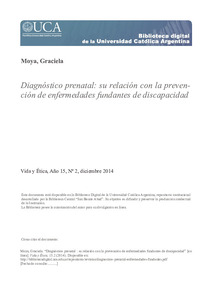Please use this identifier to cite or link to this item:
https://repositorio.uca.edu.ar/handle/123456789/1483| Título: | Diagnóstico prenatal : su relación con la prevención de enfermedades fundantes de discapacidad | Autor: | Moya, Graciela | Palabras clave: | DIAGNOSTICO PRENATAL; PREVENCION PRIMARIA; PERSONA; DISCAPACIDAD; PREVENCION DE ENFERMEDADES; BIOETICA | Fecha de publicación: | 2014 | Editorial: | EDUCA | Cita: | Moya, Graciela. “Diagnóstico prenatal : su relación con la prevención de enfermedades fundantes de discapacidad” [en línea]. Vida y Ética, 15.2 (2014). Disponible en: https://repositorio.uca.edu.ar/handle/123456789/1483 | Resumen: | Resumen: La prevención de enfermedades que fundan discapacidad es un tema central en las políticas de salud pública, y en la vida de las familias, dada la contribución de las mismas en la morbi-mortalidad perinatal. La implementación del diagnóstico prenatal genera, entonces, un dilema controversial. Por un lado, se interpreta que el diagnóstico temprano de la patología favorece el mejor desarrollo y adaptación del niño por nacer y sus familias, porque definen el estatuto moral del feto como inherente, por lo que deben recibir las mismas consideraciones morales que el niño ya nacido. Pero por otro, se asumen como medidas preventivas que disminuyen la prevalencia de enfermedades genéticas, al evitar el nacimiento de niños con estas patologías. El niño por nacer no es considerado como persona y la discapacidad se interpreta como un daño para el niño y su familia, y debe ser evitada. Tres conceptos se involucran en este conflicto: el de persona; el de discapacidad; y el de prevención de enfermedades. El objetivo del trabajo es realizar una reflexión acerca de la interpretación de estos conceptos en las diferentes visiones en bioética, que facilite una profundización de la compresión de los mismos y permita aplicar los avances tecnológicos de manera que respeten la condición humana. Abstract: The prevention of diseases which result in disabilities is a central issue in public health policies as well as it is in family lives, given the incidence of such diseases in perinatal morbidity – mortality. Therefore, the implementation of a prenatal diagnosis creates a controversial dilemma. On the one hand, an early diagnosis of the pathology favors a better development and adjustment of the unborn child and his/her family since the moral statute of the fetus is defined as inherent, so they are entitled to receive the same considerations of the already born children. But, on the other hand, this is assumed as a preventive measure to reduce the prevalence of genetic diseases by avoiding the birth of children with such pathologies. The unborn child is not considered a person and the disability is construed as damage for both the child and his/her family, so it has to be prevented. This conflict involves three concepts: the person, the disability and the disease prevention. The objective of this text is to reflect on the interpretation of these concepts from the various bioethical points of view, to help understand such concepts in depth and to allow the implementation of these technological advances with respect for the human condition. |
URI: | https://repositorio.uca.edu.ar/handle/123456789/1483 | Disciplina: | BIOETICA | Derechos: | Acceso Abierto |
| Appears in Collections: | VE - 2014 Año 15 nro. 2 |
Files in This Item:
| File | Description | Size | Format | |
|---|---|---|---|---|
| diagnostico-prenatal-enfermedades-fundantes.pdf | 291,36 kB | Adobe PDF |  View/Open |
Page view(s)
448
checked on Apr 30, 2024
Download(s)
240
checked on Apr 30, 2024
Google ScholarTM
Check
This item is licensed under a Creative Commons License

